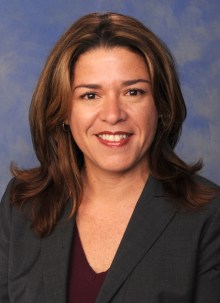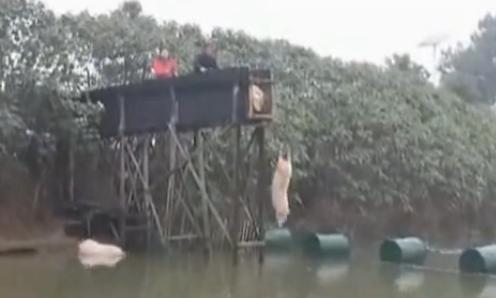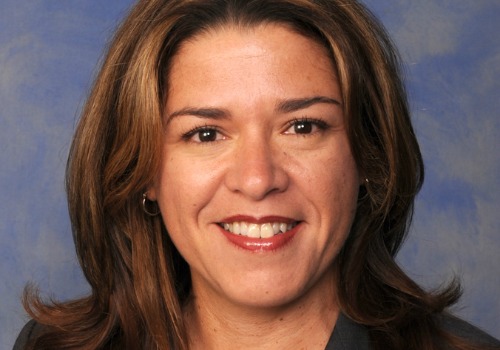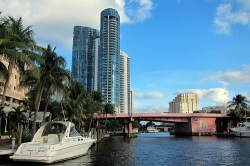
Susanne Torriente.
In Fort Lauderdale, Assistant City Manager Susanne Torriente is working to get her city government prepared for rising sea levels — and for good reason: Depending on what happens on worldwide climate action, 48 percent of South Florida could end up submerged.
Luckily, Torriente has experience weathering storms. In 2009, County Mayor Carlos Alvarez appointed the 20-year Miami-Dade County employee as sustainability director. Alvarez was the rare Republican who was very supportive of sustainability, says Torriente.
Two years later, the political climate changed. Upset over staff pay increases, property tax hikes, and a new stadium, local billionaire Norman Braman led a wildly successful recall effort against Alvarez and flooded the recall with $1 million of his personal money. “At the end of the day, Alvarez got caught up in an anti-government, anti-tax frenzy from a very conservative community,” Torriente says. After the recall, she decided to cut her losses and move on.
For a little over a year, Torriente has been restructuring and refocusing Fort Lauderdale government. “How do we look at what we do, and in light of what we know [about climate change], how do we need to start doing our jobs differently?” she asks. I talked to Torriente for Knope and change, our series on the women working to green, and in this case, save our cities. Here’s our edited conversation on talking climate in a politically polarized state.
Q. Fort Lauderdale has been called the Venice of America — and in fact, Venice is your sister city. Venice is currently experiencing historic floods.
A. We have 300 miles of canal coastline and 52 bridges in the city alone in 33 square miles. We’re all about the water here. Two or three weeks ago, we had Hurricane Sandy going through the Bahamas and the tail end of that was coupled with our full moon high tide. We experienced major tidal flooding in the city of Fort Lauderdale.
Q. Does your community seem concerned about climate change?
A. When we have situations like we had a couple of weeks ago, we talked about what was happening. We use those things as examples to show and illustrate really visibly: These things are happening and these things are happening more often. We used it as a real-life example to show that we have to start planning and thinking for a future where this is going to occur more often.
Q. Florida is a pretty politically polarized place. Has talking about climate change been controversial within your city?
A. It’s a very diverse community. It’s both sides of the aisle, Republicans, Democrats. So yeah, not everyone wants to have this conversation. When you start talking about cost, you can scare people. Or when you start talking about, “Is climate change real or not?” I tend not to have those conversations. I tend to focus on these things are in fact happening and they are happening to us now and this is a local government issue. So I try not to debate the merits of it or if it’s caused by humans. [Instead,] I point to “Los Olas was flooded two weeks ago and it’s going to happen more often and what are the things we should be doing.”
Q. How are you preparing for sea-level rise and future flooding?
A. Right now, we’re looking at our stormwater master plan: How do we take into account all of this new information and climate and extreme weather? How do we start to look at our infrastructure and plan for the next 50 years, taking into account what the possible sea-level rise scenarios are? Looking at our bridges and our roads and drainage system, what does it mean for all that? We’re in the early planning stages. It’s all about awareness and information so when we start to make decisions about government investments, we make informed and wise decisions about the future.
Since I came from Miami-Dade county, I was very much involved in the planning efforts of the Southeast Florida Climate Compact. When I came to the city, I asked my boss if I could still stay involved in the regional work. I’ve been able to stay on that staff steering committee. Over the past three years, we’ve been working on a regional greenhouse-gas baseline. We’ve been working on a unified sea-level rise projection for the region. All that has been working towards a regional action plan. How do we align our work to really making South Florida resilient to all of these changes?
Q. Your city has a reputation for yachts, tourism, and second homes. Does that affect your approach to sustainability? And how would you respond to someone who’d say that kind of lifestyle is fundamentally unsustainable?
A. We have extreme wealth on the water — beautiful homes. But like any other city, we have extreme wealth and extreme poverty.
There is a huge marine industry that has been our bread and butter for years. I’m not quite sure if we’re doing anything in particular in discussions with the marine industry just yet, but they will be at the table just like everyone else who lives here. I’ve been focusing my energy on the city engineers and the planners and focusing on city services. I’ve really focused the past year on structure and process and getting the right people in the right places. Baby steps.
Q. Where do you hope to see Fort Lauderdale in 20 years?
A. I’m hoping that it will be a city that is able to adapt to these changing times and to really be resilient. We need to make some tough decisions in terms of: Are there places where we want to invest more public infrastructure? And then are there places where we don’t want to invest it, and maybe not fight off what’s happening? I’d like to see a Fort Lauderdale that has made informed decisions and wise strategic investments.





